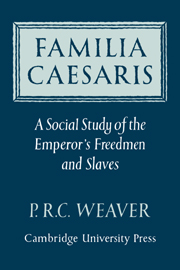Book contents
- Frontmatter
- Contents
- Preface
- Abbreviations
- INTRODUCTION
- PART I NOMENCLATURE AND CHRONOLOGY
- PART II THE FAMILY CIRCLE
- 5 Age at manumission
- 6 Age at marriage
- 7 Status of wives
- 8 Status of children
- 9 The Senatusconsultum Claudianum and the Familia Caesaris
- 10 Women in the Familia Caesaris
- 11 The marriage pattern of slaves and freedmen outside the Familia Caesaris
- PART III THE EMPEROR'S SERVICE
- APPENDIXES
- Bibliography
- Index
9 - The Senatusconsultum Claudianum and the Familia Caesaris
Published online by Cambridge University Press: 07 October 2011
- Frontmatter
- Contents
- Preface
- Abbreviations
- INTRODUCTION
- PART I NOMENCLATURE AND CHRONOLOGY
- PART II THE FAMILY CIRCLE
- 5 Age at manumission
- 6 Age at marriage
- 7 Status of wives
- 8 Status of children
- 9 The Senatusconsultum Claudianum and the Familia Caesaris
- 10 Women in the Familia Caesaris
- 11 The marriage pattern of slaves and freedmen outside the Familia Caesaris
- PART III THE EMPEROR'S SERVICE
- APPENDIXES
- Bibliography
- Index
Summary
The legal implications of a marriage pattern for Imperial slaves and freedmen where at least two-thirds of the wives were freeborn (ingenuae) must now be examined. There are two main questions; first, the legal status of the wives of Imperial slaves and freedmen who were ingenuae; and second, the status of the children who were the issue of such unions.
The general principle of the law regarding the status of children born to parents without conubium is clear – the status of the child follows that of the mother in accordance with the ius gentium (Gaius, i. 80: ‘semper conubium efficit ut qui nascitur patris condicioni accedat; aliter vero contracto matrimonio eum qui nascitur iure gentium matris condicionem sequi’. Cf. ib. 82; Ulpian, Reg. v. 9). But according to Gaius (i. 84) the rule of the ius gentium was modified by the SC Claudianum of ad 52, whereby, inter alia, the child of an ingenua could be a servus. This would seem to account for the status of the wives in the Familia Caesaris who were ingenuae and the group of children discussed above, who were Caesaris servi or Augusti liberti. Hadrian, however, according to Gaius (loc. cit.) restored the rule of the ius gentium. As most of the children with whose status we are concerned are dated to the period after Hadrian, we must therefore look elsewhere for an explanation.
The SC Claudianum itself requires closer examination. The two main sources are Gaius, i. 84, and Tacitus, Ann. xii. 53.1.
- Type
- Chapter
- Information
- Familia CaesarisA Social Study of the Emperor's Freedmen and Slaves, pp. 162 - 169Publisher: Cambridge University PressPrint publication year: 1972
- 1
- Cited by



